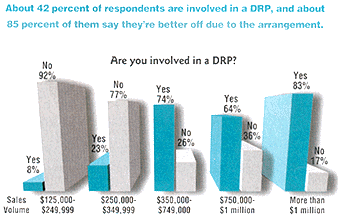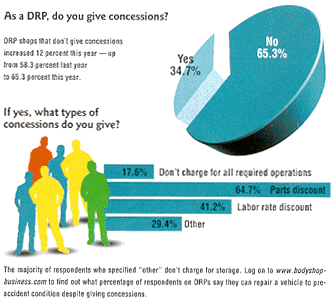“I feel DRPs give insurance companies too much power, but as a DRP, less customers are being steered away,” says one respondent, when asked if he’s better off due to his DRP arrangement.
And he’s not alone. About 85 percent of those on DRPs say they’re better off – though sometimes they admit they’re not so sure the industry is better off.
“DRPs aren’t good for the industry as a whole,” says one respondent. “But they do make relationships better.”
Other respondents who say they’re better off on DRPs cited the following reasons:
- “We benefit because of no down time due to reinspections.”
- “It’s increased our volume.”
- “They bring people to our door.”
- “Less wasted time and a quicker turnaround.”
- “Our work flow is more steady.”
- “With two DRPs, it streamlines and speeds up throughput. Although with Allstate, we’re not better off. It still takes just as many phone calls and faxes.”
On the other hand, about 15 percent of those on DRPs say they’re not better off, citing such reasons as: - “Some DRPs are better than others. I dropped out of one because it cost me too much money to be in the program.”
- “More office work.”
- “Customers like to decide where to get their cars repaired.”
- “We’re not compensated for administrative work and costs.”
- “Labor discounts.”
Just how many respondents are on DRPs? Are DRP shops giving concessions to insurers and if so, in what form? Check out the following graphs for answers to these questions – and more.
Who Decides?
About 27% of respondents say it’s the insurer’s responsibility to determine what type of parts are used in the repair. Why? “Insurance contacts give them the right,” says on respondent. “Along with that right comes the responsibility to explain their contract and method of repair to the insured.” But this respondent is in the minority, since 73% say it should be up to the repairer to determine parts usage. Reasons cited include:
- “It’s the shop that ultimately has to satisfy the customer.”
- “Insurers are only looking at their bottom line.”
- “The vehicle owner should have the final say on parts.”
- “We repair; they write the check.”
- “Because the shop will ultimately end up with the liability.”
Pay Up?
“Wet sand and buff, shop supplies, move disabled car, collision access, pain-in-ass factor,” says on respondent regarding what he wanted paid for when an insurer told him he was “the only one” charging for such things.
The majority of respondents have been in similar situations – 60% say they’ve been told the same thing by insurers at one time or another. What were they asking to be paid for? Such included:
- Frame machines set up
- Blend time
- Hazardous waste
- R&I handles, trim, cost for nuts and bolts (“They say it’s a part of doing business,” says on respondent about insurers.)
- Clearcoat and blending
- Towing mark-up
- Car cover
- Two-part seam sealers
- Mark-up on tires
- Cleanup and detail
- Interior masking
- Sand and polish
- Tear down
- Time to trim LKQ sections for installation Despite what an insurer tells them, 67% of respondents still always charge for that operation.


Which insurers still refuse to pay for OEM replacement parts when a customer objects? To find out click here!













